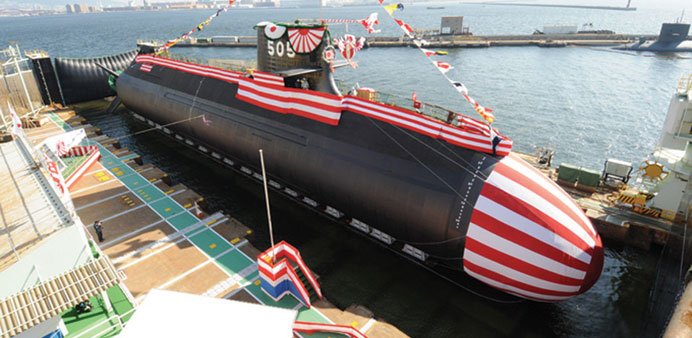Reuters/Sydney
The Japanese consortium bidding for a $35bn project to build stealth submarines for Australia said yesterday it was confident it could build boats onshore in Australia from day one, if the Australian government requests it.
Japanese defence ministry spokesman Masaki Ishikawa was effectively confirming Tokyo would be willing to build all of the submarines onshore in Australia, where manufacturing jobs are a hot political issue.
European rivals Thysenkrupp Marine Systems from Germany and French state-owned naval giant DCNS had both previously pledged to build the subs entirely in Australia, but Japan had been reticent to commit until recently.
“I think we are very confident that we can build boats from day one in Australia,” Ishikawa told reporters at a naval exposition in Sydney.
Japan is hoping Australia will chose a variant of its 4,000 tonne Soryu submarine for one of the world’s most lucrative defence contracts. It played up the high-capacity lithium ion battery, the world’s first, as well as the stealth technology that they said they were happy to share with Canberra despite concerns over espionage from Beijing in particular.
Ishikawa also told reporters he believed that the so-called hybrid option of building some boats in Japan and others onshore in Australia would be the cheapest option for Australian taxpayers.
On the sidelines of the meeting, Ishikawa conceded that the consortium, which includes the Japanese government, Mitsubishi Heavy Industries and Kawasaki Heavy Industries , had not done enough to woo the Australian public and was shifting tactics to focus more on winning the PR battle.
“We understand that we have to talk to politicians and media and the public,” he told Reuters.
Former Australian prime minister Tony Abbott and Japanese prime minister Shinzo Abe, who ended a decades-old ban on weapons exports last year, enjoyed a close relationship that saw Japan emerge as the early front runner to replace Australia’s aging Collins class subs.
But the ouster of Abbott and a series of perceived missteps by the consortium saw them lose ground to the Europeans.

The Soryu submarine
